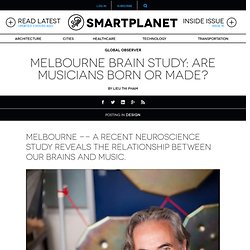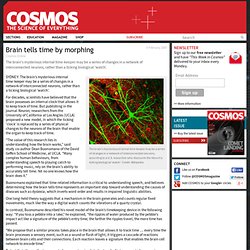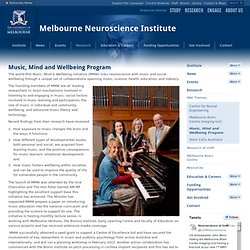

Melbourne brain study: Are musicians born or made? MELBOURNE -- Neil McLachlan says he wants to do for music what Apple did for the personal computer.

For over two decades, the scientist, artist and university professor has worked to increase music participation. "Only five per cent of people (in the West) who go through tertiary music education end up playing music,” the University of Melbourne associate professor said. “On the whole, music education has created an elitism around music performance that has caused the normal person to feel that they can’t play,” he said. McLachlan works in a multidisciplinary team at the university's Music, Mind and Wellbeing (MMW) Center, an initiative that aims to understand the relationship between our brains and music.
Brain tells time by morphing. The brain's mysterious internal time-keeper may be a series of changes in a network of interconnected neurons, according to a U.S. researcher who discounts the idea of a ticking biological 'watch'.

Credit: Wikipedia SYDNEY: The brain’s mysterious internal time-keeper may be a series of changes in a network of interconnected neurons, rather than a ticking biological ‘watch’. Melbourne Neuroscience Institute. The world-first Music, Mind & Wellbeing initiative (MMW) links neuroscience with music and social wellbeing through a unique set of collaborations spanning music, science, health, education, and industry.

The founding members of MMW are all leading researchers in: brain mechanisms involved in listening to and engaging in music; social factors involved in music learning and participation; the role of music in individual and community wellbeing; and advanced music theory and technology. Recent findings from their research have revealed: How exposure to music changes the brain and the ways it functions;How different types of developmental assets, both personal and social, are acquired from learning music, and the positive consequences for music learners' emotional development; andHow music fosters wellbeing within societies and can be used to improve the quality of life for vulnerable people in the community. Director of Music, Mind and Wellbeing: Professor Sarah Wilson.